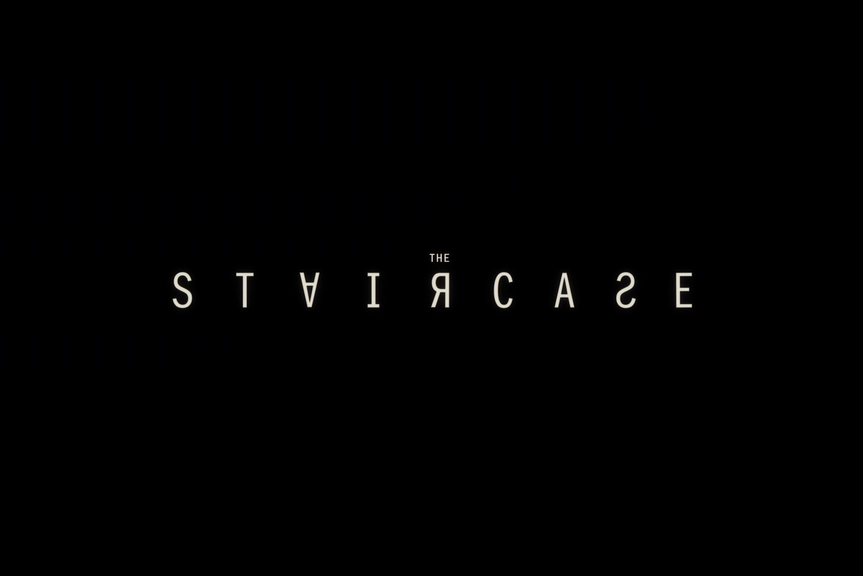In 2004, French director Jean-Xavier de Lestrade released his documentary series The Staircase, based on the true story of North Carolina writer Michael Peterson. The production explored the life and trial of Peterson, accused and ultimately convicted of the murder of his second wife, Kathleen. De Lestrade’s documentary series resonated with viewers and brought the Peterson case to international attention.
While Jean-Xavier de Lestrade’s influential work was mainly concerned with showing Michael Peterson’s legal adventures, the recent HBO Max series – also titled The Staircase – takes up the original story and enriches it in its nuances and human depth. As usual for the true crime genre, the debate centers on the innocence or guilt of the incriminated. However, the creators of the show, Maggie Cohn and Antonio Campos, include both the scandalous crime drama and the raw family drama that sparked the tragedy.

The eight-part miniseries stars a formidable cast led by Colin Firth as Michael and Toni Collette as Kathleen. The Staircase has Antonio Campos as showrunner and director for most episodes, and Maggie Cohn as writer, executive producer and co-showrunner.
About the story
Michael and Kathleen Peterson seem to be living the American dream and enjoying a full life. On December 9, 2001, at 2:40am, the author of historical novels calls 911 and explains that he has found his wife unconscious and bloody at the foot of the stairs of their home.
“My wife had an accident. She’s still breathing”, Peterson expresses to the emergency operator. “She fell down the stairs. She’s still breathing! Please come!”
The novelist states that his wife must have slipped and fallen on the stairs, under the influence of alcohol and possibly Valium. However, the crime scene reveals quite a different story. The police are quick to point out a frightening assumption: Kathleen Peterson may have been murdered by her husband.
Soon, the medical examiner in charge of the investigation concludes that Kathleen Peterson had been bludgeoned to death. The amount of blood at the scene, the spatter patterns in the surrounding area, and the subsequent discovery of lacerations on the victim’s scalp suggest that her husband may have committed the crime. And, since Michael was the only person in the house, he immediately becomes the main person of interest in the case.
At first, Michael and his children are united by grief and tragedy. But, under the immense pressure, relationships begin to crack. As the trial progresses, the family begins to fragment. The police investigation exposes shocking and delicate revelations about the man and the family. Everyone close to the novelist becomes collateral damage.
Peterson’s children are engulfed by the apparent sins of the father. Some choose to believe blindly, others succumb to doubt. The truth is the evidence against Michael Peterson, the disturbing autopsy photos, the details of his sex life, his history of lies, and the couple’s fragile financial situation give much food for thought. All members of the family are put to the test in the search for the truth.
https://www.youtube.com/watch?v=TftAFQflBy8
The HBO miniseries has gone to great lengths to track down the main hypotheses about Kathleen Peterson’s suspicious passing. As expected, the leading version is that Michael brutally murders his wife after she discovers his bisexuality. In another version, Kathleen drunkenly and distractedly falls down the stairs of their home accidentally. The “Owl Theory” is also presented, as an alternative scenario in which a barred owl attacks the woman. By delving into hypotheses and speculations, the show’s creators seek to unravel the countless twists and turns that mark the case. The fiction brings out all the possibilities for the viewer to judge Peterson’s character, the evidence recovered, and thus come to their own verdict.
The drama makes use of several timelines, a trend in vogue nowadays. Each episode plays with time, order and a bit of pacing. In this sense, time is manipulated to show the Peterson family before and after Kathleen’s death. The jumps to the past – prior to the loss – allow us to know the victim as a human being and reflect on her life, her achievements, and her contradictions; Kathleen is portrayed as a loving wife and mother, a woman overburdened by her work and family responsibilities. According to this drama, Michael Peterson continually placed his wife in overwhelming situations.
The series also explores the heavy emotional burden that the descendants of Peterson are forced to carry. Without the fundamental pillars of the household, the family nucleus becomes fragile. Although the Petersons’ enormous brood – Clayton (Dane DeHaan), Todd (Patrick Schwarzenegger), Caitlin (Olivia DeJonge), Margaret (Sophie Turner), and Martha (Odessa Young) – strive to overcome adversity and support each other, something has broken in an insurmountable way. That fateful night in December 2001 took away the family life and future they once imagined.
A great achievement of director Antonio Campos was the introduction of the documentary work of his counterpart Jean-Xavier de Lestrade. And the fact is that Peterson, his family, and his lawyers had an important opening with the filmmaker and his team. It is noteworthy that Jean-Xavier de Lestrade’s angle reveals the powerful relationship between the cameras and the way truth is told to the audience. As the French filmmakers debate the construction of the documentary, the viewer infers the enormous influence of media management and the dominant role of public opinion.
The American legal system is also fully represented in the show. The crime drama delves into both legal sides. On the one hand, it reflects the work of the Durham District Attorney team, headed by James Hardin. On the other hand, it shows the work of defense attorney David Rudolf and his collaborators. Through this narrative line, the viewer has access to the ongoing investigation, the testimonies, the evidence, the construction of the judicial narrative, the contradictions, and the most unusual details of the case.
It should be added that the HBO Max series reconstructs the story of Michael Peterson until February 2017, when the novelist files an Alford plea, where a person pleads guilty while maintaining their innocence. As a result of this appeal, Peterson is sentenced to time served and officially becomes a free man. At the close of the show we see Michael return home to his loved ones. Despite all this, the mystery of Kathleen’s death remains unsolved.
Unsurprisingly, actors Firth and Collette have powerful chemistry on camera. Colin Firth is inscrutable: as affectionate as he is coercive, as manipulative as he is sensitive, and as wounded as he is narcissistic. For her part, Toni Collette is a magnetic presence who openly wins the viewer’s sympathy. She is continually cornered by the demands of her environment and Collette permeates everything with her warmth and sensitivity.
Does fiction have anything to contribute to a story that already has a docuseries? Undoubtedly. Antonio Campos goes beyond the crime drama and explores angles that have been little attended to so far. HBO’s dramatization is a safe bet. The Staircase is absorbing, raw and fascinating.
Image and Gage Skidmore

